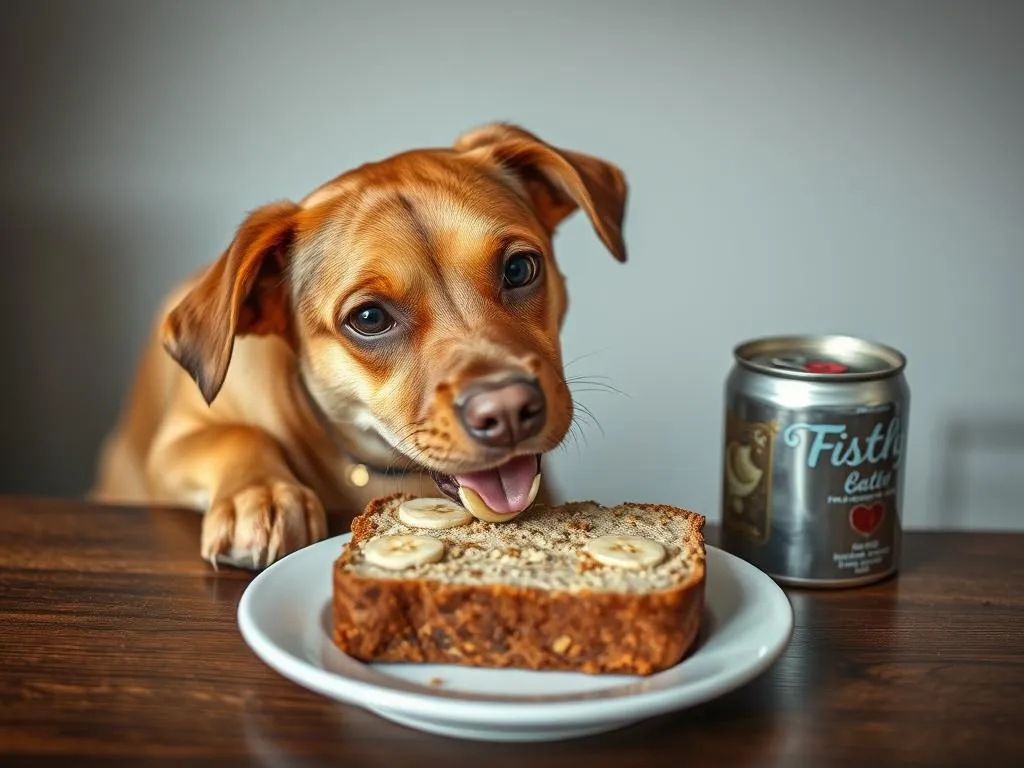
Introduction
When it comes to dog nutrition, understanding what constitutes a balanced diet is crucial for the wellbeing of our furry friends. Just like humans, dogs require a variety of nutrients to thrive, and more pet owners are beginning to share their food with their canine companions. One popular human treat that often raises questions among dog owners is banana bread. Can dogs eat banana bread? This blog post aims to explore the safety and health implications of feeding banana bread to dogs, as well as how to do so responsibly.
Understanding Dog Nutrition
Importance of Proper Nutrition for Dogs
Proper nutrition is the cornerstone of a healthy dog. Dogs require a balanced intake of essential nutrients, including proteins, fats, carbohydrates, vitamins, and minerals. Each nutrient plays a unique role:
- Proteins: Essential for growth and repair of tissues.
- Fats: Provide energy and support cell function.
- Carbohydrates: Offer a quick energy source and aid digestion.
- Vitamins and Minerals: Crucial for various bodily functions, including immune response and bone health.
Neglecting these nutritional needs can lead to serious health consequences, such as obesity, diabetes, and other chronic conditions.
Common Dietary Needs by Dog Breed and Size
Nutritional requirements can vary significantly based on a dog’s breed, age, and size. For example, larger breeds may require more protein to support muscle mass, while smaller breeds may need higher calorie density due to their faster metabolism. Additionally, dogs with specific health conditions, such as allergies or obesity, may benefit from tailored diets that address their unique needs.
What is Banana Bread?
Ingredients in Banana Bread
Banana bread is a beloved baked good made primarily from mashed bananas, flour, sugar, eggs, and baking soda. Depending on the recipe, variations may include additional ingredients like nuts, chocolate chips, or spices, which can enhance flavor but also introduce potential risks for dogs.
Nutritional Profile of Banana Bread
The nutritional profile of banana bread can vary widely based on the recipe used, but generally, it contains a significant amount of calories, carbohydrates, and sugars. A typical slice can contain:
- Calories: 200-300 per slice
- Carbohydrates: 30-40 grams
- Fats: 5-10 grams
- Sugars: 10-15 grams
While bananas provide some health benefits, including potassium, vitamin C, and fiber, these benefits may be overshadowed by the high sugar and carbohydrate content in banana bread.
Can Dogs Eat Banana Bread?
Safety of Banana Bread for Dogs
The answer to the question, can dogs eat banana bread, is not a simple yes or no. The primary ingredients in banana bread, like bananas and flour, are generally safe for dogs in moderation. However, caution is necessary regarding certain ingredients that could be harmful.
- Nuts: Many banana bread recipes include nuts, such as walnuts or macadamia nuts, which are toxic to dogs.
- Chocolate: If the bread contains chocolate chips, it should be avoided entirely, as chocolate is highly toxic to dogs.
- Sugar: The high sugar content may lead to weight gain and dental issues, and some dogs may experience gastrointestinal upset from consuming too much sugar.
Health Benefits of Bananas for Dogs
Bananas can be a healthy snack for dogs when given in moderation. They are rich in potassium, which supports heart and muscle function, and vitamin C, an antioxidant that helps boost the immune system. The fiber content in bananas can also aid digestion. However, it’s essential to be mindful of portion sizes, as too many bananas can lead to digestive problems.
Risks of Feeding Banana Bread to Dogs
While banana bread can be safe in small amounts, there are risks associated with its consumption:
- High Sugar Content: Excessive sugar can lead to obesity and other health issues, including diabetes.
- Allergies or Intolerances: Some dogs may be allergic or intolerant to specific ingredients, leading to symptoms like itching, vomiting, or diarrhea.
- Digestive Issues: Dogs that consume too much banana bread may experience bloating or gastrointestinal upset.
How to Safely Incorporate Banana Bread into a Dog’s Diet
Homemade Banana Bread for Dogs
Making dog-friendly banana bread at home is a great way to ensure that your pup enjoys the treat without the harmful ingredients found in many commercial products. Here’s a simple recipe:
Dog-Friendly Banana Bread Recipe
Ingredients:
– 2 ripe bananas, mashed
– 1 cup whole wheat flour
– 1/4 cup unsweetened applesauce
– 1 egg
– 1/2 teaspoon baking soda
Instructions:
1. Preheat your oven to 350°F (175°C).
2. In a bowl, mix the mashed bananas, applesauce, and egg until well combined.
3. Gradually add the flour and baking soda, mixing until a batter forms.
4. Pour the batter into a greased loaf pan.
5. Bake for 30-40 minutes, or until a toothpick inserted into the center comes out clean.
6. Allow it to cool before serving a small piece to your dog.
Store-Bought Banana Bread Considerations
If you’re considering store-bought banana bread, be sure to read the ingredient list carefully. Look for products that do not contain chocolate, nuts, or xylitol, which is extremely toxic to dogs. Some brands may offer dog-safe options, but it’s always best to err on the side of caution.
Portion Control and Frequency
When introducing banana bread into your dog’s diet, moderation is key. A small piece, equivalent to a few bites, is sufficient as an occasional treat. Regularly feeding banana bread can lead to weight gain or other health issues due to its high sugar and carbohydrate content.
Alternatives to Banana Bread for Dogs
Other Safe Fruits for Dogs
If you’re looking for alternatives to banana bread, there are plenty of safe fruits you can share with your dog. Here are some dog-friendly fruits:
- Apples: Rich in vitamins A and C; remove seeds and core.
- Blueberries: Packed with antioxidants and low in calories.
- Pumpkin: High in fiber and great for digestion (ensure it’s plain, not spiced).
Dog Treat Recipes
Making homemade dog treats can be a fun and healthy way to reward your pup. Here are a couple of simple recipes:
Peanut Butter Treats
Ingredients:
– 1 cup whole wheat flour
– 1/2 cup peanut butter (make sure it doesn’t contain xylitol)
– 1/4 cup water
Instructions:
1. Preheat the oven to 350°F (175°C).
2. Mix all ingredients until a dough forms.
3. Roll out the dough and cut into shapes.
4. Bake for 15-20 minutes until golden brown.
Sweet Potato Chews
Ingredients:
– 1 large sweet potato
Instructions:
1. Preheat the oven to 250°F (120°C).
2. Slice the sweet potato into thin strips.
3. Place on a baking sheet and bake for 3 hours, flipping halfway through.
Conclusion
In summary, while banana bread can be a tempting treat for dogs, it’s essential to consider the ingredients and nutritional impact carefully. Homemade banana bread can be a safer alternative, ensuring that your dog enjoys a delicious snack without harmful additives. Always remember to consult with your veterinarian for personalized dietary advice and recommendations, especially if you’re considering introducing new foods into your dog’s diet.
FAQs
Can puppies eat banana bread?
Puppies have different nutritional needs than adult dogs. It’s best to avoid giving puppies banana bread, as their digestive systems are still developing and may be sensitive to certain ingredients.
How much banana bread can I give my dog?
A small piece, roughly the size of a bite, is appropriate as an occasional treat. Avoid making it a regular part of your dog’s diet.
What should I do if my dog eats too much banana bread?
If your dog consumes a large quantity of banana bread, monitor them for signs of digestive upset, such as vomiting or diarrhea. Contact your veterinarian if symptoms persist or worsen.
Are there any other human foods I should avoid giving my dog?
Yes, several human foods are toxic to dogs, including chocolate, grapes, onions, garlic, and foods containing xylitol. Always research before sharing any human food with your dog.









